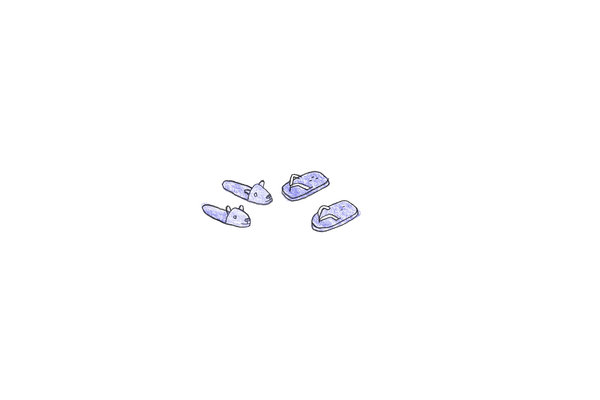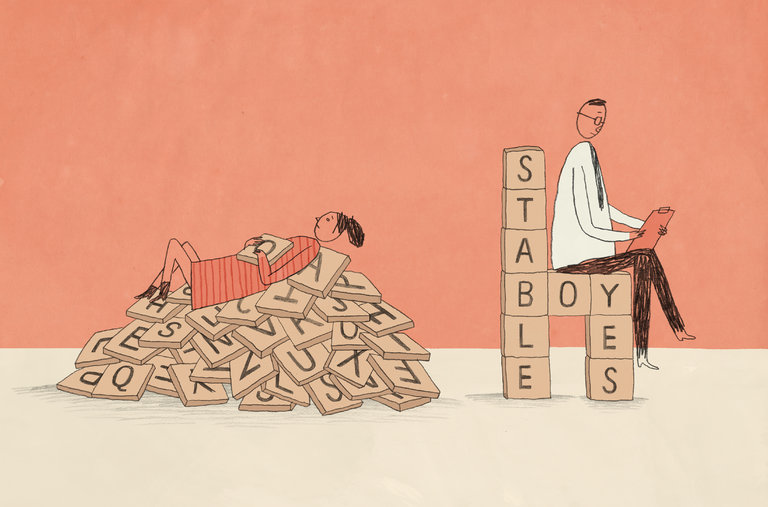During six years of singlehood in my 20s, I became a person I did not know. Before, I had always been a reader. I walked to the library several times a week as a kid and stayed up late into the night reading under my blankets with a flashlight. I checked out so many books and returned them so quickly the librarian once snapped, “Don’t take home so many books if you’re not going to read them all.”
“But I did read them all,” I said, unloading them into her arms.
I was an English major in college and went on to get a master’s in literature. But shortly after the spiral-bound thesis took its place on my shelf next to the degree, I stopped reading. It happened gradually, the way one heals or dies.
When I created my OkCupid profile (screen name: missbibliophile52598), I filled out the “favorite books” section, letting my taste in literature speak for me: “100 Years of Solitude,” “A Moveable Feast,” “White Teeth,” “The Namesake,” “The Known World,” “The God of Small Things,” “How to Read the Air.” But a twinge of panic surged through me when I realized it had been more than two years since I had read most of those titles, and more than five years for some.
Despite my track record, I tried to maintain my bookish persona. I joined book clubs on Meetup.com that I never attended. I requested the library copy of Kazuo Ishiguro’s “Never Let Me Go” because everyone else was reading it, only to return it a week late, unread, with fines.
I still loved the idea of reading. I treasured books and bookstores. Whenever I found one, I would linger between the shelves for hours as if catching up with old friends, picking out volumes I had read and buying new ones I hadn’t.
When my father’s girlfriend gave me a book by Joel Osteen for Christmas, I returned it for Toni Morrison’s “A Mercy.” I also bought a collection of short stories by Dostoyevsky. But I didn’t read either of them.
David was my first OkCupid date — my first online date of any kind. He was tall and nice, if awkward. I asked him question after question to keep him at ease and the conversation flowing, but also to deflect his attention (a classic introvert trick).
His profile said he liked to read, so I asked him about his last book. His face lit up and his fingers danced. I realized within the first several weeks that David read much more than I did, about a book or two a week. We seemed an unlikely couple: me, a 5-foot-3 black woman born to a Caribbean mother, and him, a 6-foot-4 white guy from Ohio. But as we got to know each other, our shared faith and mutual love of books bridged our gaps.
The first time David visited my house, we compared libraries. We only had four titles in common, two of which were C.S. Lewis collections. David preferred history and nonfiction, whereas I gravitated toward fiction writers of color and immigrant narratives.
Months later, when we began to discuss the possibility of getting married one day, I didn’t broach the subject of combining our libraries — not because I feared having to untangle them someday but because I liked having my own stories to share.
On our seventh date, David and I visited the central library downtown.
“I have a game,” he said, pulling two pens and pads of sticky notes out of his bag. “Let’s find books we’ve read and leave reviews in them for the next person.”
We wandered through the aisles for over an hour. In the end, we sat on the floor among the poetry, and I read him some of Linda Pastan’s verse. He listened, his head tilted down, chin pressed into his chest, and then he asked, “What is it you like about that one?”
That spring, as we picnicked outside, I said, “If I tell you something, will you not judge me?”
David paused from listing the titles he planned to read over summer and raised his eyebrows.
“I’ve only read one book this year,” I said. “I’ve started three others but just haven’t finished them.”
“But it’s June,” he said.
“I know.”
“One book?”
“I know.”
“But you like books,” he said. “You like bookstores. You like libraries.”
“Is it a deal breaker?”
“No, but still. Read a book!”
I was painfully aware of the glaring hypocrisy in my life. I defended the virtues of bookstores in the age of online retailing and bought books whenever I got the chance, but I hardly read them. They sat on every surface until my house appeared to wear books the way one wears clothes. They piled up on chairs and draped across sofa arms.
The Japanese language has a word for this: tsundoku. The act of acquiring books that go unread.
The shelves of my bookcase sag in the middle, and not just because it’s made of cheap plywood. It’s because each shelf holds two rows of books, an inner and an outer.
If I want to find a book from college or before, I know to reach back to the inner row. If I want to find a more recent addition, I look along the edge. Surrounding the bookshelf are stacks containing different categories of books. There are: Books I Have Read. Books I Want to Read. Books I Started but Did Not Finish Because I Did Not Like Them. Books I Started and Loved but Could Not Justify Reading Given Their Graphic Sexual or Violent Content. That category contains two books by Philip Roth.
The last time I visited a dollar bookstore, I bought five titles for myself and two for David. His charge to “read a book” echoed in my head. One afternoon I picked up one of the dollar hardbacks I bought solely for its poetic title.
I had a hard time getting into it. The narrator was supposed to be an old man but sounded more like what a young woman thought an old man might sound like. Whenever I was tempted to give up on it, I thought of David. He had just started reading “Infinite Jest.”
I pushed through the first two chapters and discovered a new narrator in the third. I loved the alternating points of view. I carried the book to work and read at lunch. I read on my walk home, occasionally lifting my eyes to make sure I avoided strangers and uneven concrete.
I felt smug that while most of my millennial peers also walked with their heads down, eyes hovering just above their palms, I was not merely scrolling through Instagram. I was reading. Reading a book.
“How’s your day?” he texted.
“Good. A little tired,” I replied. “I stayed up late reading and finished my book.” I tried to slip it in casually but I was proud of myself. The last time I’d pulled an all-nighter to read I was 12 and the book was “Little Women.”


It was not a competition, but there was a push. I felt him pushing me to be more of the person I used to be and more of who I wanted to be. Whenever he turned to discussing his current nonfiction book about the rise of Silicon Valley or environmental philosophers, I would tell him of fiction, of men who left their countries by hiding in boxes only to climb out and turn into birds. I would remind him that sometimes the only way to explain the world we live in is to make it all up.
I asked David once what he liked about me.
He paused, then said, “You make me less cynical. I see the world as a more wonder-filled place with you.”
A little over a year after our date at the library, David suggested we visit again. As we walked along the shelves, he asked if I remembered the game we played on our first visit, when we put Post-it note reviews in our favorite books.
“I remember,” I said.
He pulled a book from the shelf, dropped to one knee and opened it. Inside, his Post-it read: “Karla, it has always been you. Will you marry me?”
His proposal had rested between the pages of “The Rebel Princess” for over a year.
“Yes,” I said. “I’ll marry you.”
We embraced in the middle of the fiction aisle, surrounded by other people’s stories and about to begin our own.
Karla Marie-Rose Derus is a writer in Los Angeles.
Modern Love can be reached at modernlove@nytimes.com.
To hear Modern Love: The Podcast, subscribe on iTunes or Google Play Music. To read past Modern Love columns, click here. Continue following our fashion and lifestyle coverage on Facebook (Styles and Modern Love), Twitter (Styles, Fashion and Weddings) and Instagram.







